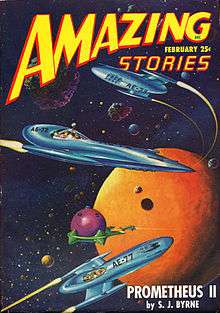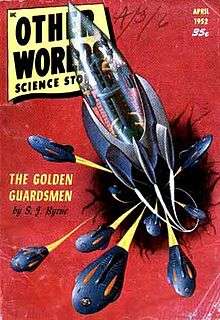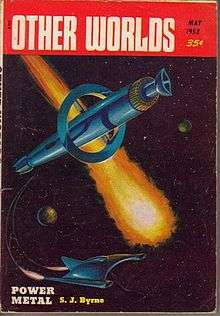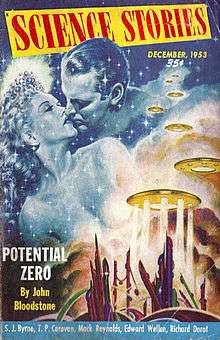Stuart J. Byrne
| Stuart J. Byrne | |
|---|---|
| Born |
Stuart James Byrne 26 October 1913 St. Paul, Minnesota, USA |
| Died | 23 September 2011 |
| Occupation | screenwriter and Author |
| Language | English |
| Nationality | American |




Stuart James Byrne (October 26, 1913 - September 23, 2011) was an American screenwriter and writer of science fiction and fantasy. He published under his own name and the pseudonyms Rothayne Amare, John Bloodstone, Howard Dare, and Marx Kaye (a house pseudonym).[1]
Biography
Byrne was born in St. Paul, Minnesota.[2] Later, he recalled, "I was in there early enough to see magic lantern slides instead of movies, to watch the little man in the black suit climb his ladder to light our gas lamp out front, and in the early twenties I was excited by whisperings of a thing called radio!"[2] Favorite fiction memories of the time included Grimm's Fairy Tales, Alice in Wonderland, L. Frank Baum's Oz stories, the Rover Boys, the Boy Allies, Gernsback science-fiction, and "the life-changing impact of the Edgar Rice Burroughs books."[2]
At the age of twelve, he moved with his family to California. In his teen years, his interest in science fiction continued. He also became an avid amateur astronomer. Years later, he recalled that "many a summer night ... were spent in awe ... in the Pleiades and the great Orion Nebula, or surfing the moons of Jupiter and rings of Saturn. In fact at fifteen I was grinding parabolic mirrors for my amateur telescope."[2]
In the 1930s, he married Joey and fathered two children, Richard and Joanne; he now has three grandchildren and three great-grandchildren. He earned an M.A. at UCLA. He published his first science fiction story, entitled "Music of the Spheres" in Amazing Stories in 1935. It told how a young man sacrificed his life to send a passenger spaceship away from a fatal encounter with the sun. In their capsule review of the book, Bleiler and Bleiler state, "The story, which is purple in writing, now considers the sensations of the young man as he approaches death in the sun, fancying that he hears the music of the spheres."[1]
In the 1940s and 1950s, Byrne published in Science Stories, Amazing Stories, Imagination (magazine), and Other Worlds (magazine).
Byrne's character, Michael Flanagan, appeared as the hero of three stories published in Amazing Stories: "The Land Beyond the Lens," "The Golden Gods," and "The Return of Michael Flannigan," all listed as by John Bloodstone. The first two of these stories were collected as Godman (spelled "Godman!" on the cover) in 1970. According to Byrne's later reminiscence, the name "John Bloodstone" was suggested by Ray Palmer to fool Howard Browne, the editor of Amazing, who had requested that Palmer write a story about a picture showing a man going through some kind of lens. Palmer passed the job over to Byrne, but eventually confessed the switch to Browne.[3]
Tarzan, the Unpublishable
In 1955, Byrne became known as the author of an unpublishable new Tarzan novel called Tarzan on Mars via an editorial called "Tarzan Never Dies," by editor Ray Palmer, in Other Worlds Science Stories magazine.[4] The novel could not be published because Palmer was unable to get authorization from the estate of Edgar Rice Burroughs.
Men into Space
As a screenwriter, Byrne wrote for the "Men into Space" TV show in 1959 and 1960. He is credited with writing the episode entitled "Quarantine" (1959) and providing the story for the one entitled "Contraband" (1960).[5] He received credit for the story of the 1971 film called "The Deserter" as well as the original story and screenplay for the 1972 film "The Doomsday Machine".[5] According to Bleiler and Bleiler, he was also a screenwriter for the 1975 film Journey into Fear,[1] although he is not so credited in the IMdb online database.
Thundar
Byrne reverted to the Bloodstone pseudonym for the publication of his original paperback novel Thundar. This vivid novel of the adventures of Michael Storm, also known as Thundar, on earth in the far future is one of Byrne's best. After a framing device concerning Michael Storm's diaries, the story begins with Storm's adventures in the Peruvian mountains searching for the legendary time-gate of Viricocha. According to Byrne, "The scenes and locale of the opening adventure in the Peruvian Andes are authenticated by the fact that I spent some years in those mouintains, following the trails of Pizarro while guided by archaic Spanish manuscript".[2] If the style seems reminiscent of that of Edgar Rice Burroughs, it may not be surprising. Byrne said, "An ERB attorney once suggested to me that I try writing my own ERB-style fantasy adventures using my own characters. The result was Thundar - Man of Two Worlds, written also in the ERB classical fantasy style, under my fantasy pen name, John Bloodstone."[6]
A case can be made that "Thundar - Man of Two Worlds" inspired the 1980 children's cartoon show "Thundarr the Barbarian" through its mixture of swords and superscience.
Perry Rhodan
In the 1970s, Byrne also worked as a translator on the Perry Rhodan series from German to English. He is credited as co-author with Clark Dalton of the two-part story called "Test Flight to Eden" (1975), which appeared in two consecutive Perry Rhodan books. When there were financial problems publishing Perry Rhodan books due to a change in the exchange rate between German and US currencies, Byrne undertook to write the Star Man series, of which 11 appeared in print, published by Forrest J. Ackerman's Master Publications.[7] The first story was the Supermen of Alpha.
Gothic
Also in the 1970s, Byrne tried his hand at Gothic writing from the first-person female point of view.[8] The result was The Visitation, originally published in 1977, and republished as Hoaxbreaker in 2003.
e-Books
Since 1998, many of Byrne's stories have been published in electronic form. They are all listed as by "Stuart J. Byrne," with "writing as John Bloodstone," etc. as appropriate.
Published work
Short stories
Byrne's published short stories included:
- Music of the Spheres, Amazing Stories, August, 1935
- Prometheus II, Amazing Stories, February, 1948
- Colossus I, Other Worlds, May 1950
- Colossus II, Other Worlds, July 1950
- Colossus III, Other Worlds, September, 1950
- Beyond the Darkness, Other Worlds, July 1951
- Matter of Perspective, Other Worlds, October 1951
- Gsrthnxrpqrpf, Other Worlds, March 1952
- Land Beyond the Lens (by John Bloodstone), Amazing Stories, March 1952
- The Golden Gods (by John Bloodstone), Amazing Stories May 1952
- Return of Michael Flannigan (by John Bloodstone), Amazing Stories August 1952
- The Golden Guardsmen, Other Worlds, April, June, and July, 1952
- The Ultimate Death (by Howard Dare), Other Worlds, July 1952
- The Naked Goddess, Other Worlds, October, 1952
- Lady of Flame (reprint of The Naked Goddess), Authentic Science Fiction Monthly, #30, February 1953
- Children of the Chronotron, Imagination, December 1952
- Power Metal, Other Worlds, May, June, and July, 1953
- The Bridge, Science Stories, December 1953
- Potential Zero (by John Bloodstone), Science Stories, December 1953
- Last Days of Thronas (by John Bloodstone), Science Stories, February 1954
- Beware the Star Gods, Imagination, June 1954
- The Metamorphs, Other Worlds, January 1957
- Spaceship Named Desire, Other Worlds, July 1957
- Test Flight to Eden (Part 1 of 2), by Stuart J. Byrne and Clark Darlton, in Perry Rhodan #68: Stars of Druufon, 1975
- Test Flight to Eden (Part 2 of 2), by Clark Darlton and Stuart J. Byrne, in Perry Rhodan #69: The Bonds of Eternity, April 1975
- Star Man 1: Supermen of Alpha, Perry Rhodan #137: The Phantom Horde / Star Man 1-5, Master Publications, 1979
- Star Man 2: Time Window, Perry Rhodan #137: The Phantom Horde / Star Man 1-5, Master Publications, 1979
- Star Man 3: Interstellar Mutineers, Perry Rhodan #137: The Phantom Horde / Star Man 1-5, Master Publications, 1979
- Star Man 4: The Cosmium Raiders, Perry Rhodan #137: The Phantom Horde / Star Man 1-5, Master Publications, 1979
- Star Man 5: The World Changer, Perry Rhodan #137: The Phantom Horde / Star Man 1-5, Master Publications, 1979
- Star Man 6: Slaves of Venus, Master Publications (assumed), publication date unknown.
Novels
- Starman (1969), Powell Sci-Fi, PP 165, Powell Publications, Reseda, CA.
- Godman (1970) (writing as John Bloodstone), Powell Sci-Fi, PP 205, Powell Publications, Reseda, CA (front cover gives title as "Godman!").
- Thundar (1971) (writing as John Bloodstone), Leisure Books, North Hollywood, CA (front cover gives title as "Thundar: Man of Two Worlds", spine says "Thundar!", and title page says "Thundar").
- The Alpha Trap (1976), Major Books, Canoga Park, CA.
- The Visitation (1977) (writing as Rothayne Amare), Major Books, Canoga Park, CA.
- Star Quest (2006), Trafford Publishing, Victoria, BC, Canada.
References
Notes
- 1 2 3 Bleiler and Bleiler 1998, p. 49.
- 1 2 3 4 5 Byrne, Stu. "Who Is S. J. Byrne AKA John Bloodstone? An Autobiography". ERBzine, vol. 1967. Retrieved 22 September 2011.
- ↑ Stuart J. Byrne, 2010 phone interview of Stuart J. Byrne with publisher Jean Marie Stine, Futures Past Editions
- ↑ Palmer, Ray (November 1955). "Tarzan Never Dies". Other Worlds. Retrieved 22 September 2011.
- 1 2 "Stuart J. Byrne". Internet Movie Database. Retrieved 22 September 2011.
- ↑ Byrne, S.J. "There's More To The Story!". ERBzine, vol. 1967. Retrieved 22 September 2011.
- ↑ Byrne, Stuart J., 2010 phone interview with publisher Jean Marie Stine, Futures Past Editions
- ↑ "About the Author" afterward section in S. J. Byrne, Hoaxbreaker, Trafford Publishing, Victoria, Canada, 2003
External links
Bibliography
- Bleiler, Everett F. with Richard J. Bleiler. Science-Fiction: The Gernsback Years. Kent, OH: Kent State University Press, 1998. ISBN 0-87338-604-3.
| Wikimedia Commons has media related to Stuart J. Byrne. |